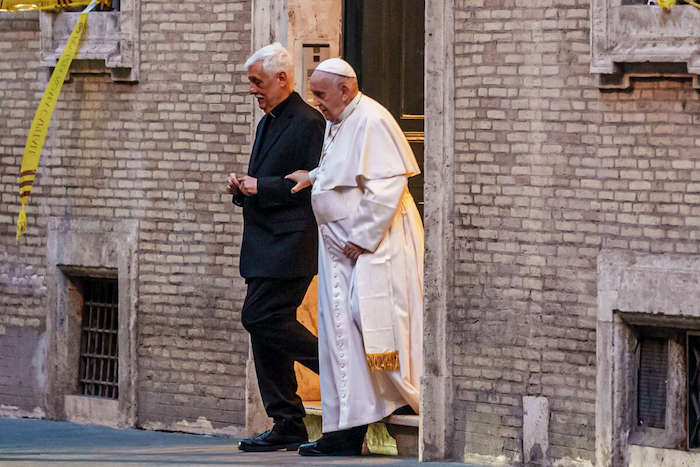
By NICOLE WINFIELD
The head of Pope Francis’ Jesuit religious order admitted Wednesday that a famous Jesuit priest had been convicted of one of the most serious crimes in the Catholic Church some two years before the Vatican decided to shelve another case against him for allegedly abusing other adult women under his spiritual care.
The Rev. Arturo Sosa, the Jesuit superior general, made the admission during a briefing with journalists that was dominated by the scandal over the Rev. Marko Ivan Rupnik and the reluctance of both the Vatican and the Jesuits to tell the whole story behind the unusually lenient treatment he received even after he had been temporarily excommunicated.
Rupnik is unknown to most Catholics but is a giant within the Jesuit order and the Catholic hierarchy because he is one of the church’s most sought-after artists. His mosaics depicting biblical scenes decorate the basilica in Lourdes, France, the Vatican’s own Redemptoris Mater chapel, the John Paul II institute in Washington and are due to grace the new basilica in Aparecida, Brazil.
The scandal involving Rupnik erupted last week when three Italian blogs — Silere non Possum, Left.it and Messa in Latino — began revealing allegations of spiritual, psychological and sexual abuse against Rupnik by women at a Jesuit community with which he was affiliated in his native Slovenia.
The Jesuits initially responded with a statement Dec. 2 that confirmed a complaint had been received in 2021 but said the Vatican’s sex abuse office had determined that the allegations, dating from the 1990s in Slovenia, were too old to prosecute. The Jesuits said they decided nevertheless to keep in place “precautionary restrictions” on his ministry that prohibited him from hearing confessions, giving spiritual direction or leading spiritual exercises.
The statement posed more questions than it answered and entirely omitted the fact — first reported by Messa in Latino and later confirmed by The Associated Press — that Rupnik had been convicted and sanctioned by the Vatican after a 2019 complaint that he had absolved a woman in confession of having engaged in sexual activity with him.
The so-called absolution of an accomplice is one of the most serious crimes in the church’s canon law and brings with it automatic excommunication for the priest that can only be lifted if he admits to the crime and repents — something Rupnik did, Sosa said in response to a question from the AP.
The Congregation for the Doctrine of the Faith “said it happened, there was absolution of an accomplice,” Sosa said. “So he was excommunicated. How do you lift an excommunication? The person has to recognize it and has to repent, which he did.”
Sosa had previously insisted the Jesuits weren’t hiding anything else about Rupnik. Asked why the Jesuits hadn’t revealed the confession-related conviction, Sosa said Wednesday that “they were two different moments, with two different cases.”
Sosa then contradicted the Jesuits’ earlier statement and said the restrictions on Rupnik’s ministry actually dated from that confession-related conviction, and not the 2021 allegations that the Vatican’s sex crimes office decided to shelve because they were deemed too old to prosecute.
There has been no explanation for why the office, which regularly waives statute of limitations for abuse-related crimes, decided not to waive it this time around, especially considering the previous conviction for a similarly grave offense against an adult woman. The office, now called the Dicastery for the Doctrine of the Faith, is headed by a Jesuit, has a Jesuit sex crimes prosecutor and had as its No. 2 at the time someone who lived in Rupnik’s Jesuit community in Rome.
Sosa was asked what, if anything, Francis knew about Rupnik’s case or whether he intervened. Sosa said he “could imagine” that the prefect of the dicastery, the Jesuit Cardinal Luis Ladaria, would have informed the pope of such a decision.
Officials at the Dicastery either didn’t respond to emails seeking comment or declined to comment, referring questions to the Vatican spokesman, who in turn referred questions to the Jesuits.
Complete Article ↪HERE↩!
Old sex-abuse claims bankrupt a Bay Area Catholic diocese. Will others follow?
— Bishop cited an “insurmountable number of claims”
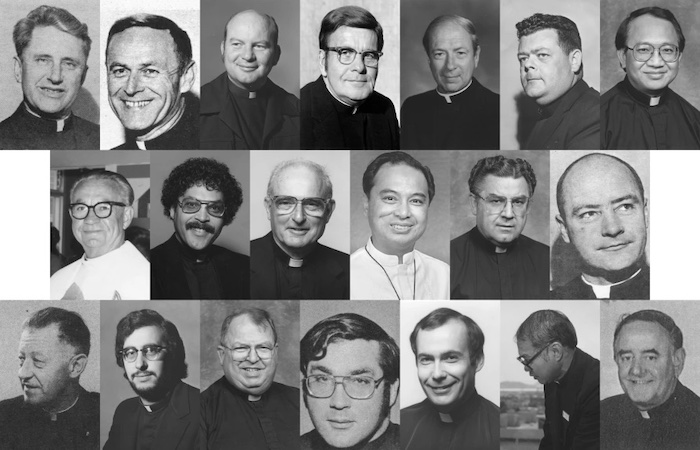
Payouts for childhood sexual abuse claims have taken a financial toll on a host of venerable American institutions that provided youth programs where predators lurked, from the Boy Scouts of America to Penn State, Michigan State and numerous church organizations.
With a three-year window for new claims of decades-old abuse closing at the end of this month, the Diocese of Santa Rosa, one of five Roman Catholic dioceses serving the Bay Area, has announced it will file for bankruptcy protection early next year.
“It is the inevitable result of an insurmountable number of claims,” Bishop Robert F. Vasa wrote in an announcement last Friday that said the diocese is facing more than 130 abuse claims dating back to its establishment in 1962, mostly from the 1970s and 1980s.
The claims are made possible by AB 218, a California law that made it easier to file claims of decades-old sex abuse otherwise barred by the statute of limitations from 2020 through 2022. Attorneys representing the now middle-aged claimants said they expected more than 1,000 fresh lawsuits and that some dioceses would seek bankruptcy protection.
Vasa, whose diocese oversees parishes in Sonoma, Napa, Mendocino, Lake, Humboldt and Del Norte counties, said Chapter 11 bankruptcy protection will “bring all parties together in one place to resolve difficult claims fairly and finally, with the supervision of the bankruptcy court.” At the same time, he said, it “will provide a way for the Diocese to continue the various charitable ministries in which it is engaged.”
But SNAP, the Survivors Network of those Abused by Priests, said that dioceses across the country have used bankruptcy “to protect secrets, not assets.” Bankruptcy, they said, limits the claimants’ “discovery” process of seeking records and sworn testimony about the handling of reported abuse.
“It is a sad day for transparency and justice,” SNAP said in a statement. While acknowledging the Diocese of Santa Rosa is “one of California’s most impacted dioceses” by abuse claims, SNAP also questioned its insolvency, noting its charitable organization just reported its biggest year in donations.
The Diocese of Santa Rosa had no comment beyond the bishop’s statement.
What impact a bankruptcy might have on worshippers is unclear. Bishop Vasa in his statement said that “the parishes and Catholic schools within our Diocese are separate civil corporations or separate ecclesial entities and should not be parties to this filing.”
But he added that “there are many matters to be discerned by the bankruptcy court and so absolute certainty about the degree of participation by any other entities such as parishes and schools will be determined in the course of the proceedings.”
Whether other dioceses will follow Santa Rosa into bankruptcy court remains unclear. It is not the first California Catholic diocese to do so. The Diocese of Stockton filed for bankruptcy protection in 2014, citing $14 million in legal expenses over sex abuse claims. The Diocese of San Diego filed for bankruptcy protection in 2007 before reaching a nearly $200 million settlement with 144 alleged abuse victims.
The Catholic Church in the U.S. has paid more than $2 billion in legal expenses from the clergy sex abuse scandal that emerged in lawsuits, investigations and news reports back to the 1980s. Claims largely ended after U.S. Catholic churches adopted a zero-tolerance policy toward abusers two decades ago. But lawmakers in California, New York, Arizona and New Jersey recently allowed new claims to be filed by people who said they were abused by priests decades ago. In many cases those priests have since died.
The Bay Area’s other dioceses are the Archdiocese of San Francisco, covering San Francisco, San Mateo and Marin counties; the Diocese of Oakland, spanning Alameda and Contra Costa counties; the Diocese of San Jose in Santa Clara County; and the Diocese of Sacramento, which includes Solano County.
So far, none have indicated plans to seek bankruptcy protection, though they have not ruled it out.
The Diocese of San Jose said it isn’t considering bankruptcy “at this time.” The Diocese of Oakland said claims are still being processed and “it’s premature . . . to make a determination on future actions.”
The Archdiocese of San Francisco said “litigation-related issues, whether individual or in the aggregate, would be addressed through appropriate legal channels and not through speculation in media outlets.” The Diocese of Sacramento said “no decision or filing has been made.”
Complete Article ↪HERE↩!
Crisis of confidence over cardinal shakes Cologne Catholics
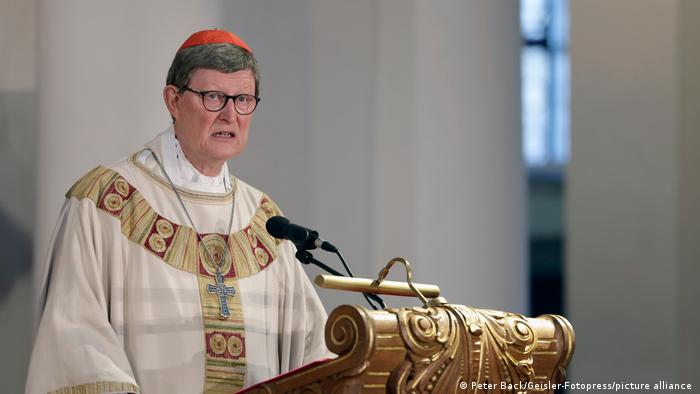
by KIRSTEN GRIESHABER
An unprecedented crisis of confidence is shaking a historic center of Catholicism in Germany — the Archdiocese of Cologne. Catholic believers have protested their deeply divisive archbishop and are leaving in droves over allegations that he may have covered up clergy sexual abuse reports.
While Cardinal Rainer Maria Woelki’s personal fate is in the hands of Pope Francis, the drama has reverberations nationwide, given that the Cologne archdiocese has more Catholics than any other in Germany — about 1.8 million. Its double-domed cathedral is an iconic tourist attraction and one of the oldest, most important pilgrimage sites of Northern Europe.
And the crisis in Cologne, in which many thousands of Catholics in the region have left the church, is in some ways a microcosm of the issues playing out in the German Catholic Church as a whole as it undergoes a profound and controversial reform process precisely to respond to complaints by rank-and-file Catholics about the hierarchy’s responsibility for the clergy abuse crisis.
Some archdiocese employees have refused to attend meetings with the archbishop. Congregants of a Duesseldorf parish in the archdiocese raised red cards in protest when he visited last year, objecting to him administering the sacrament of confirmation to their children.
Dozens of altar boys and girls from the archdiocese turned their backs in protest to Woelki when he celebrated Mass with them during a trip to Rome in October. The choirs in the archdiocese recently reported a loss of 30% of their members, which they say is partially related to the coronavirus pandemic but also a clear repudiation of Woelki.
In the latest escalation, Cologne prosecutors last month opened an investigation against the powerful conservative cardinal in two cases on suspicion of making false affidavits. In each case, the question is whether Woelki, 66, had been informed earlier than he stated about allegations of abuse against certain clergymen. The cardinal rejects all accusations against him.
Even influential German politicians who normally steer clear of church politics have spoken out.
The minister for youth and family in the state of North Rhine-Westphalia, where Cologne is located, said she viewed the situation with bewilderment.
“Especially those in positions of responsibility must not look the other way and they must certainly not deny or cover up,” Josefine Paul said last month in a speech in the state parliament.
The church is expected to be a preeminent model of morality, and it has “set the highest moral standards for all kinds of people in society — does all this no longer apply to a bishop?” Tim Kurzbach, chairman of the diocesan council of Catholics in the archdiocese, told The Associated Press.
Kurzbach, mayor of the town of Solingen in the archdiocese, said he knows of several long-time parishioners who are leaving the church because they can no longer bear “the moral decay” in Cologne.
The crisis of confidence began in 2020, when Woelki, citing legal concerns, kept under wraps a report he commissioned on how local church officials reacted when priests were accused of sexual abuse. That infuriated many Cologne Catholics. A second report, published in March 2021, found 75 cases in which high-ranking officials neglected their duties.
The report absolved Woelki of any neglect of his legal duty with respect to abuse victims. He subsequently said he made mistakes in past cases involving sexual abuse allegations but insisted he had no intention of resigning.
Two papal envoys were dispatched to Cologne a few months later to investigate possible mistakes by senior officials in handling cases. Their report led Pope Francis to give Woelki a “ spiritual timeout ” of several months for making major communication errors.
In March, after his return from the timeout, the cardinal submitted his offer to resign but so far Francis has not acted on it.
“I don’t think it got through to Rome how much the people here are suffering,” Kurzbach said. “Without a decision on the Cologne cardinal question, we will not get out of the crisis. The question must finally be resolved.”
The issue was raised when Germany’s bishops visited with the pope last month. The head of the German Bishops Conference, Limburg Bishop Georg Baetzing, told reporters that “it was made very clear that the situation in the archdiocese is increasingly unbearable, even for the archbishop.” The wait for a papal decision also is burdensome for German Catholics, he said.
In the interim, they are exiting the church in record numbers. Some 44,772 Catholics in the Cologne archdiocese left in 2021, up from 17,281 in 2020, according to church figures.
Nationally, the number of Catholics leaving the church has also risen dramatically. Some 359,338 left in 2021, up from 221,390 in 2020. It is still the largest faith group in the country. About 21.6 million Catholics live in Germany, which has an overall population of 84 million.
“It’s clear that this is a difficult situation,” Cologne archdiocese spokesman, Juergen Kleikamp, told the AP last week. “But that’s just the way it is. In the Catholic Church, the pope has to decide and no one else.”
Meanwhile, Woelki is “doing his work to the best of his knowledge and also with great commitment,” Kleikamp said, adding that while some Catholics “are angry and quarrel with their church, there are others who applaud and rejoice when the bishop comes.”
Many Catholics, however, doubt the crisis can be easily fixed any time soon — even if the cardinal resigns.
Lay leader Regina Oediger-Spinrath, 61, called it “an absolute crisis of trust and credibility.” She is a spokeswoman for the professional association of pastoral assistants in the archdiocese, and thinks the crisis goes beyond the Cologne situation. Oediger-Spinrath said fundamental changes are needed, including more equality for women and LGBTQ people.
“Leadership needs to be rethought,” she said. “The way it is in the Catholic Church, that is absolutely hierarchical, some also say authoritarian from the top down — I believe, that many people no longer want to go along with that.”
Those demands are in line with the reform process, known as the “ Synodal Path,” the German church launched with the country’s influential lay group, the Central Committee of German Catholics, to respond to the clergy sexual abuse scandals after a 2018 report found at least 3,677 people were abused by clergy between 1946 and 2014.
Preliminary assemblies have already approved calls to allow same-sex couple blessings, married priests and the ordination of women deacons. The movement, however, also sparked fierce opposition from the Vatican and conservative clergy in Germany and elsewhere.
While Oediger-Spinrath says she is ready to fight for changes, others have lost patience.
“I will leave the church,” says Peter Barzel, 65, a member of the St. Margareta parish in Duesseldorf. He helped organize last year’s red card protest during Woelki’s visit.
Barzel, an active parishioner for decades, also tried to bring more attention to recent sexual abuse allegations lodged against two former St. Margareta pastors that have roiled the parish. Eventually, he gave up.
“I will certainly miss something when I leave the church, because the Christian faith is something you share with other people,” he said. “But I can no longer support this system.”
Complete Article ↪HERE↩!
Suspended New Orleans deacon pleads guilty to molesting preteen boy
— VM Wheeler, 64, admits indecent behavior with juvenile in latest twist to Catholic church’s molestation scandal
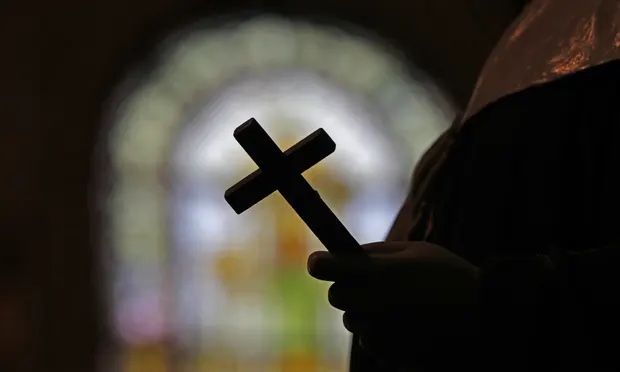
By Ramon Antonio Vargas
The clerical molestation scandal that for decades has engulfed the Roman Catholic church in New Orleans took another turn on Tuesday, when a suspended deacon pleaded guilty to charges that he sexually abused a preteen boy two decades earlier, before the defendant’s ordination as a clergy member.
Virgil Maxey “VM” Wheeler III, 64, pleaded guilty to four charges of indecent behavior with a juvenile filed against him in state court in Jefferson parish, which neighbors New Orleans. He agreed to serve five years of probation in exchange for that plea, avoid contact with the victim for the rest of his life and register as a sex offender for 15 years, court records show.
Meanwhile, prosecutors dismissed charges of sexual battery of a child younger than 13 that they had initially leveled against him. The dismissed charges could have carried 10 years in prison if he had been convicted, based on Louisiana law in effect at the time of the admitted abuse.
Court documents spelling out Wheeler’s plea noted that the abuse occurred between 2000 and 2002.
Despite Tuesday’s plea, Wheeler is still facing a civil lawsuit demanding damages for his now acknowledged victim.
That suit claims – among other assertions – that prominent local Catholics unsuccessfully mounted a pressure campaign to get the victim to abandon his allegations against Wheeler, who was also a well-known attorney in the area, including an offer of $400,000 for the victim to stop cooperating with law enforcement officials.
Wheeler was once friends with the family of his accuser, whose identity is known but has not been published in news reports because media outlets do not name victims of sexual abuse without their permission.
The unresolved civil lawsuit alleges that the victim’s mother – knowing Wheeler dreamed of becoming a deacon – had reported to local church officials years ago that Wheeler had tried to coax the victim and the victim’s brother into bed during a ski trip when the victim was 12.
Nonetheless, church officials have maintained that the victim did not fully disclose details of his abuse at the hands of Wheeler until the summer of 2020. The New Orleans church by then had ordained Wheeler as one of its deacons, who are similar to priests, though they can join the clergy despite being married.
But the victim’s report against Wheeler prompted New Orleans’s archbishop, Gregory Aymond, to suspend Wheeler from his work as a deacon at a church in a suburban part of the city. Prosecutors in Jefferson parish charged Wheeler late last year. He declared himself not guilty at first but reversed himself Tuesday.
The victim on Tuesday read a statement in court that in part discussed how his pursuit of justice demonstrated how “you can turn pain into power”.
It wasn’t immediately clear whether the New Orleans archdiocese would add Wheeler to a list of clerics who have worked – or were ordained – locally and have been credibly accused of sexually abusing minors or vulnerable adults.
Aymond’s initial release of that list in 2018 – the same year as Wheeler’s ordination – led to a wave of lawsuits against the church, which has since filed for chapter 11 bankruptcy protection. The list’s release was meant as an act of transparency aimed at parishioners who had lost faith amid new revelations at the time linked to the global church’s clerical abuse crisis, dating back decades.
Last week, the Guardian was first to report that one of the claims filed as part of the bankruptcy case was from a former New Orleans seminarian who in the 1990s alleged that he was harassed at a local college which trains priests, including by Aymond, who was the school’s rector at the time. Aymond vehemently denies the claim.
Complete Article ↪HERE↩!
Why I find pope’s ideas on women priests disturbing
— Pope Francis must call together and listen to women, not only religious but lay women as well
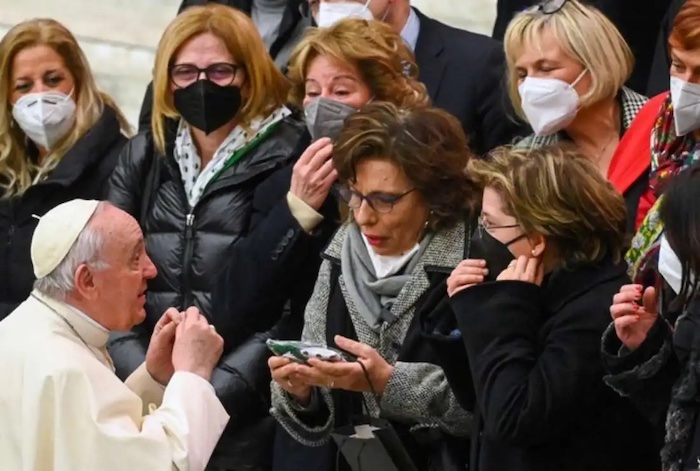
Recently the Jesuit-run America Magazine interviewed Pope Francis on various topical issues, among them the question regarding what he would say to women who are already serving in the church, but who also feel strongly about the call to be a priest in the Catholic Church.
Pope Francis reinforces the gender binary by pointing to the Petrine principle which means Jesus chose Peter as head of the Church and 12 male apostles because Jesus our high priest was male!
Pope Francis suggests that women have no place in the Petrine principle.
On the other hand, the Marian principle is a mirror of the Church as a woman and as the spouse of Christ. So, he suggests that women have to be content with being the mirror image of the Church which represents the feminine spouse of Christ — what a convoluted explanation to convey to women that we are an important part of the Catholic Church dominated by men.
“There are numerous articulate and excellent women theologians who have already been speaking of women’s positions in the Church”
As a woman, I do not know whether to laugh or cry at Pope Francis’ suggestion about women’s position in the Church. How can an institution that is ruled solely by men be ‘woman?’ How can such an institution be the ‘spouse’ of Christ?
I wonder if perhaps this theological idea of the Church as a woman and as the spouse of Christ and the male priests as representing Christ could be the root of the sexual abuse of women by clergy.
Pope Francis suggests that women’s place in the Church is a theological problem that needs to be sorted out by coming up with a theology on women.
When Pope Francis says” we need to come up with a theology on women,” does he mean the male leaders come up with a theology of women?
I would like to remind Pope Francis that there are numerous articulate and excellent women theologians who have already been speaking of women’s positions in the Church.
Pope Francis’ reiteration of the Petrine and Marian principles is an indication that he as the leader of the Church has not bothered to read the writings of feminist theologians of the past 50 years.
Feminist scripture scholars have pointed out that Jesus never ever ordained any priests. The last supper had both men and women present when he said “Do this in memory of me.” Women disciples in the scriptures were Jesus’ most faithful followers. He even chose a woman to carry the good news of his resurrection to the world. Would Jesus not want women leaders in the Church?
The third explanation that the pope gives is what he describes as the ‘administrative’ one.
He points out that In the Church there is the ministerial and ecclesial role which is reserved for men. Then there is the administrative role which has so far been dominated by men, but Pope Francis has recently begun opening it up for women’s participation.
He concedes “we have to give more space to women.”
While women appreciate the steps Pope Francis has taken to bring reform in the Church and the Roman Curia, his response to women’s ordination has disturbed a lot of progressive-thinking women and men, especially when he calls it a theological problem.
“Women’s voices have been missing at the decision-making table in the Church”
It is pertinent to note that the theology that Pope Francis has quoted has been articulated by men from a male perspective.
Women entered the field of theology only after the Second Vatican Council. Since then women have been studying scriptures and interpreting them through a woman’s lens which has brought in new and fresh perspectives that men could never see.
But somehow the Church has not recognized these perspectives nor listened to what women have to say. Women’s voices keep getting dismissed based on a theology that has not been updated to include women’s thinking about God and how God speaks to women in the context of their lives.
The reason why women need a place at the ‘table’ is that it is only through ordained ministry that one gets to make decisions that affect all in the Church. Women’s voices have been missing at the decision-making table in the Church.
The forthcoming Synod on Synodality is about listening to the voices of all. Women in the Church have been the most enthusiastic participants in synodal discussions at the grassroots, but their voice has not been heard, because the male leaders in the Church get to choose whose voice gets heard.
No one can deny that women are the most active participants at the parish and pastoral level of the Church. Yet women continue to be kept down like the proverbial ‘slaves’ in the Church. Yet what women all over the world are asking for is active ministerial roles, but they are being dumbed down by theological mansplaining.
Pope Francis has asked that all join the listening sessions. Somehow the bishops chose only those who they feel comfortable with while others are just never listened to. Can Pope Francis find a way to listen to voices from groups that have remained on the peripheries?
If the pope is really serious about fostering a culture of ‘encounter’ and ‘listening’ in the Church, he will call together women, not only religious but lay women as well, and listen to them. Today modern means of communication can easily facilitate this. May Spirit Sophia continue to work and inspire the Church towards wholeness.
Complete Article ↪HERE↩!
